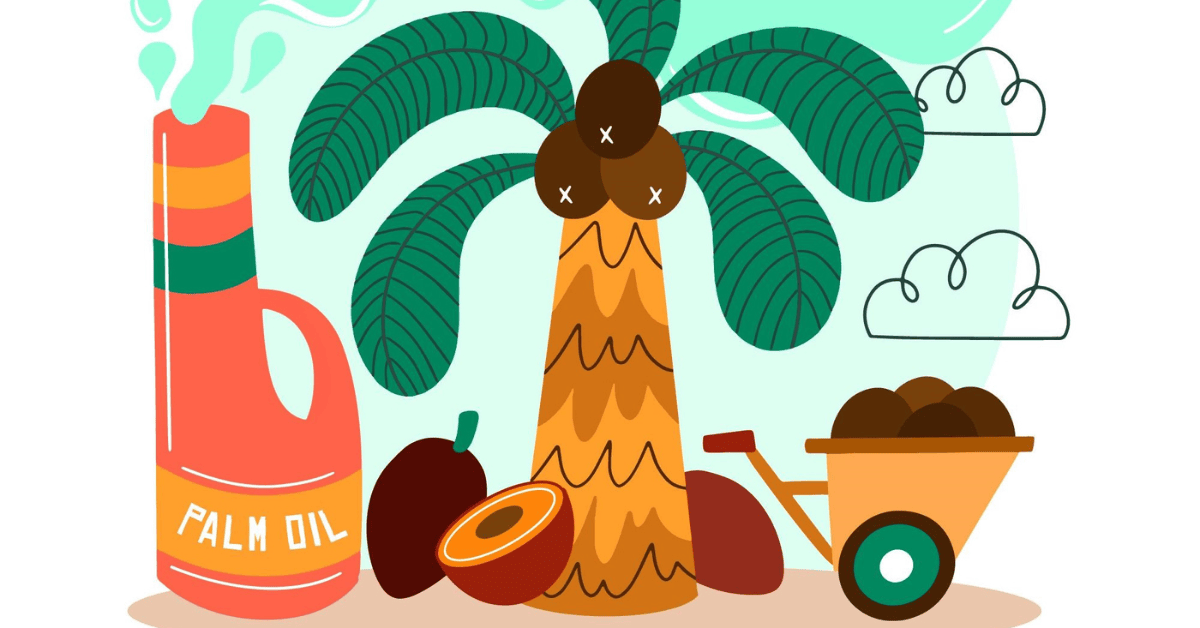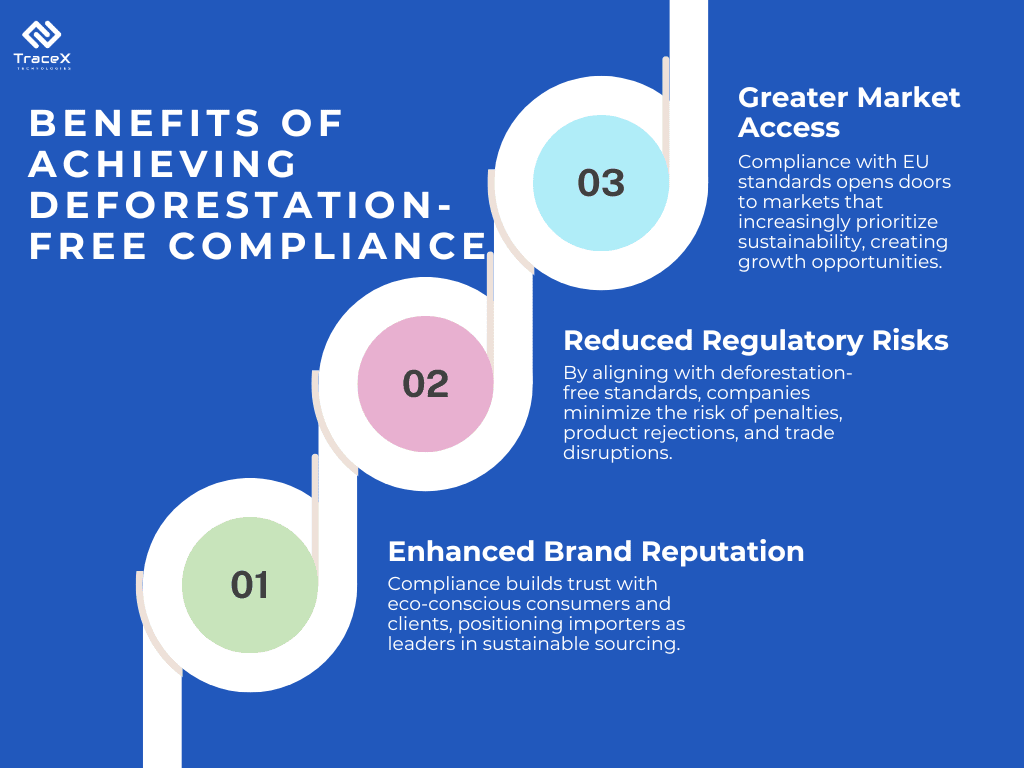Contact: +91 99725 24322 |
Menu
Menu
Quick summary: Understanding and meeting deforestation compliance requirements is essential for the oleochemical industry, especially under regulations like the EUDR. This guide offers importers insights into sourcing sustainably and ensuring traceable, deforestation-free supply chains.

As sustainability regulations tighten worldwide, the oleochemical industry finds itself at a critical intersection of environmental responsibility and business continuity. Oleochemicals derived from palm oil and other agricultural sources are crucial to products ranging from cosmetics and personal care items to cleaning agents, lubricants, and food additives. Deforestation compliance in the oleochemical industry is a challenge for the oleochemical importers.
In this guide, we’ll dive deep into the reasons why deforestation compliance is so challenging for oleochemical importers, unpack the implications of EUDR, and outline practical strategies for navigating these hurdles.
Key Takeaways
Oleochemicals are chemical compounds derived from natural oils and fats, primarily from plant sources like palm oil and soybeans. In the case of palm oil, the oil undergoes processes such as hydrolysis and transesterification to produce fatty acids, fatty alcohols, and glycerin, which are foundational for many oleochemical products. Similarly, soybeans are processed to extract soybean oil, which can also be transformed through similar methods to yield oleochemicals. These compounds are widely used in personal care, food, and industrial applications due to their renewable nature and versatility.
Oleochemicals derived from palm and soy play a significant role in products where sustainable and biodegradable ingredients are preferred. However, regulatory frameworks, like the EU Deforestation Regulation (EUDR), now focus on ensuring these sources are deforestation-free, highlighting the need for traceability in oleochemical supply chains to meet compliance and sustainability goals.
Oleochemicals are derived primarily from plant-based oils like palm and soy, with palm oil being a leading source due to its versatility and cost-efficiency. However, palm oil production has long been associated with deforestation, which not only threatens biodiversity but also accelerates climate change by releasing significant carbon emissions into the atmosphere. Large-scale palm oil cultivation has been linked to habitat loss for endangered species, soil degradation, and air pollution from slash-and-burn practices, especially in key producing regions like Southeast Asia.
With the global push towards sustainable sourcing, the environmental footprint of oleochemicals has come under increased scrutiny. Governments, advocacy groups, and consumers alike are demanding higher standards of transparency and environmental responsibility from oleochemical importers, putting companies under pressure to comply with evolving regulations like the EUDR.
The EUDR, or EU Deforestation Regulation, is a legislative measure aimed at combating deforestation linked to the import of certain goods into the European Union. This regulation mandates that companies importing products like palm oil, soy, wood, rubber, coffee, cocoa, and their derivatives, including oleochemicals, must demonstrate that these products are not associated with deforestation or forest degradation.
The scope of EUDR extends beyond raw materials, making it one of the most comprehensive deforestation regulations to date. For oleochemical importers, compliance isn’t as straightforward as tracing back to the source of raw palm oil. Oleochemicals often undergo multiple processing stages, are blended with other materials, and are transformed into a myriad of products that reach global markets. Tracing the exact origin of each batch becomes complex, especially when dealing with suppliers who may not have visibility into their own supply chains.
As a result, oleochemical importers face significant challenges in aligning with EUDR standards, and failure to comply could mean penalties, product bans, or damaged reputations in a highly competitive industry.
Unlike raw commodities, oleochemicals are often processed and refined through multiple stages, which can obscure their origin and make tracking difficult. Importers must deal with extensive supply chains, involving multiple suppliers, intermediaries, and processors who may not have full visibility into the deforestation impact of their sources.
While some certifications exist, such as the Roundtable on Sustainable Palm Oil (RSPO) certification, there is no universally adopted standard for traceability in oleochemicals. This lack of standardization means that companies must often navigate a patchwork of certifications, reports, and sustainability claims, which can be costly and time-consuming.
Proving that a product is deforestation-free requires accurate, verifiable data. However, with current supply chain complexities, it’s challenging to authenticate every stage of production. Even with advanced technology, importers need to ensure that data is reliable and that suppliers are accountable for their sustainability practices.
Implementing a traceability system to comply with EUDR involves significant upfront investments in technology, supplier engagement, and third-party verification. For smaller importers, the cost of compliance can be a major barrier, leading to difficulties in maintaining competitive pricing.
With these challenges in mind, let’s explore practical steps oleochemical importers can take to ensure compliance with EUDR and other deforestation-free standards.
Technology can be a game-changer in the journey to compliance. Digital traceability platforms, such as blockchain and Internet of Things (IoT) solutions, provide real-time insights into supply chains, allowing importers to verify the origins of oleochemicals with greater accuracy.
Supplier collaboration is essential for achieving transparency. Importers must establish open communication channels with suppliers to ensure that they understand EUDR requirements and are committed to providing accurate data.
Certifications from reputable organizations can help streamline the compliance process and add credibility to sustainability claims. Some certifications relevant to palm-based oleochemicals include:
Not all suppliers and regions carry the same level of risk for deforestation. Implementing a risk-based approach allows importers to focus resources on high-risk areas and suppliers, making compliance efforts more effective and cost-efficient.
Regulatory standards for deforestation are likely to evolve in the coming years. Importers should stay informed about policy updates and engage with industry associations to ensure they remain compliant. A proactive approach to regulatory updates can prevent costly compliance gaps.

Leveraging blockchain for traceability in oleochemical compliance can significantly streamline the process of meeting EU Deforestation Regulation (EUDR) requirements. By using blockchain technology, companies can create an immutable record of each product’s journey from raw material sourcing to finished goods. This transparency allows for easy verification of compliance with sustainability standards, helping to ensure that products are not linked to deforestation. In addition, it fosters trust among consumers and stakeholders by providing verifiable proof of ethical sourcing practices.
Engaging suppliers in sustainable sourcing practices is crucial for oleochemical importers facing EUDR compliance challenges. By collaborating closely with suppliers, importers can ensure that sourcing aligns with environmental standards and traceability requirements. This engagement involves educating suppliers about sustainability practices, sharing best practices, and establishing clear expectations for compliance. Leveraging technology like blockchain can enhance transparency, enabling importers to verify that raw materials are sourced responsibly and ethically. Ultimately, this collaboration not only meets regulatory requirements but also builds stronger relationships and fosters a more sustainable supply chain.
The TraceX EUDR compliance platform streamlines the entire process of ensuring regulatory adherence through several key features:
1. Data Collection from Multiple Upstream Sources: The platform facilitates the aggregation of data from various suppliers, enabling comprehensive visibility across the supply chain.
2. Data Aggregation and Standardization: It standardizes the collected data, ensuring consistency and accuracy for analysis and reporting.
3. Creating a Consolidated GeoJSON File: TraceX can generate a unified GeoJSON file that summarizes spatial data for compliance assessments.
4. Upload GeoJSONs from Suppliers: Suppliers can easily upload their GeoJSON files, ensuring all necessary information is captured.
5. Remote Sensing for Deforestation Detection: The platform integrates remote sensing technology to monitor deforestation, enhancing risk assessments.
6. Generate Compliance Reports: Automated reporting tools allow for easy generation of compliance documentation, streamlining the review process.
7. Initial Supplier Risk Assessment: The platform supports initial risk assessments, helping businesses identify and mitigate potential compliance issues early on.
Overall, TraceX provides a comprehensive solution for oleochemical importers to navigate EUDR compliance efficiently and effectively.
As regulations evolve, so will the technology and practices that enable compliance. While EUDR presents immediate challenges for oleochemical importers, it also offers an opportunity to innovate and establish stronger, more resilient supply chains. By leveraging technology, building supplier partnerships, and adopting industry certifications, oleochemical importers can not only meet today’s standards but also prepare for future sustainability demands. The path to deforestation-free compliance is challenging but crucial for oleochemical importers. With regulations like EUDR reshaping the industry, companies must proactively adopt traceability technology, engage with suppliers, and prioritize sustainability to succeed. As more businesses embrace these practices
The EUDR mandates that importers of products like palm oil and soy derivatives, including oleochemicals, verify and document deforestation-free sourcing to meet compliance.
Importers can use traceability platforms, conduct supplier audits, and verify supply chain origins to ensure compliance with deforestation regulations.
Technology such as blockchain and satellite monitoring helps in tracking product origins, monitoring deforestation risks, and generating compliance reports to meet regulatory standards.
